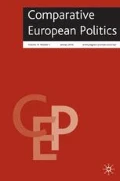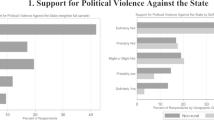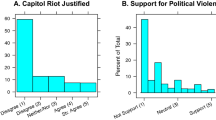Abstract
Using data from the 2012 European Social Survey (ESS) and the 2017 Polpart survey we compare public support for the use of referendums in Switzerland, the Netherlands, the UK, and Hungary before and after the referendums on Mass Immigration (2014), EU–Ukraine Relations (2016), Brexit (2016), and the EU Migrant Quota (2016). We show that overall referendum support declined between 2012 and 2017 in all countries, but especially the Netherlands where the government openly challenged the merits of direct democracy. We also provide evidence that referendum support became more strongly linked to the so-called losers of modernization (i.e. politically dissatisfied, socio-economically disadvantaged, or anti-immigration individuals) in all countries except Switzerland. However, changes in the determinants of referendum support are driven by a decline in support among the winners of modernization (i.e. politically satisfied, socio-economically advantaged, and pro-immigration individuals) rather than an increase in support among the losers whose attitudes stayed more or less the same. Furthermore, we argue that the association between attitudes towards government and referendum support differs between contexts where referendums are government-initiated versus government-challenging.







Similar content being viewed by others
Change history
03 August 2021
A Correction to this paper has been published: https://doi.org/10.1057/s41295-021-00248-3
Notes
Age: 18–34: 40%; 35–49: 45%; 50–65: 15%; sex: 50% female; college graduate: 40%; some college or university: 50%; high school or less: 10%. employed: 70%; not in labour force: 30%.
As recommended by Johnson (2008) the weights were constructed sequentially as opposed to independently, thereby reducing the distortion of distributions caused by the combination of weights, i.e. first we constructed a gender weight; then an education weight based on a gender-weighted sample; and finally an age weight based on a gender and education-weighted sample.
In all of the interaction plots the other independent variables are kept constant at their means.
References
Altman, D. 2011. Direct democracy worldwide. Cambridge: Cambridge University Press.
Anderson, C., and E. Goodyear-Grant. 2010. Why are highly informed citizens skeptical of referenda? Electoral Studies 29(2): 227–238.
Balls, K. 2018. I used to think the Brexit referendum would revitalize politics. I was wrong. The Guardian, 27 December 2018.
Bengtsson, Å., and M. Mattila. 2009. Direct democracy and its critics: Support for direct democracy and ‘stealth’ democracy in Finland. West European Politics 35(5): 1031–1048.
Bovens, M., and A. Wille. 2017. Diploma democracy: The rise of political meritocracy. Oxford: Oxford University Press.
Bowler, S., D. Denemark, T. Donovan, and D. McDonnell. 2017. Right-wing populist party supporters: Dissatisfied but not direct democrats. European Journal of Political Research 56(1): 70–91.
Bowler, S., T. Donovan, and J.A. Karp. 2007. Enraged or engaged? Preferences for direct citizen participation in affluent democracies. Political Research Quarterly 60(3): 351–362.
Brady, H.E., S. Verba, and K.L. Schlozman. 1995. Beyond SES: A resource model of political participation. American Political Science Review 89(2): 271–294.
Bustikova, L. 2018. The radical right in Eastern Europe. In The Oxford handbook of the radical right, ed. J. Rydgren. Oxford: Oxford University Press.
Christmann, A., and D. Danaci. 2012. Direct democracy and minority rights: Direct and indirect effects on religious minorities in Switzerland. Politics and Religion 5(1): 133–160.
Coffé, H., and A. Michels. 2014. Education and support for representative, direct and stealth democracy. Electoral Studies 35: 1–11.
Conservative Party Manifesto. 2015. https://www.conservatives.com/yourmanifesto. Accessed 5 Apr 2017.
Culik, J. 2016. Hungary’s invalid refugee referendum dents Viktor Orbán’s anti-EU ‘revolution’. The Conversation, 3 October.
Dalton, R.J., W.P. Bürklin, and A. Drummond. 2001. Public opinion and direct democracy. Journal of Democracy 12(4): 141–153.
Dalton, R.J., S.E. Scarrow, and B.E. Cain. 2003. Democracy transformed? Expanding political opportunities in advanced industrial democracies. Oxford: Oxford University Press.
Donovan, T. 2019. The promise and perils of direct democracy: an introduction. Politics and Governance 7(2): 169–172.
European Social Survey. 2012. ESS Round 6 (Edition 2.4). Bergen: Norwegian Centre for Research Data.
Foster, P., N. Squires, and R. Orange. 2016. EU faces ‘Brexit’ contagion as populist parties across Europe call for referendums. The Telegraph, 24 June.
Freitag, M., A. Vatter, and S. Müller. 2015. Switzerland’s immigration challenge: viewpoints and insights in the aftermath of the mass immigration initiative. Swiss Political Science Review 21(1): 1–4.
Hainmueller, J., and D. Hangartner. 2015. Does direct democracy hurt immigrant minorities? Evidence from naturalization decisions in Switzerland. American Journal of Political Science 63(3): 530–547.
Henley, J. 2016. Why referendums are problematic—Yet more popular than ever. The Guardian. https://www.theguardian.com/politics/politicalscience/2016/oct/06/why-referendums-are-problematic-yet-more-popular-than-ever. Accessed 12 Apr 2017.
Hobolt, S.B. 2016. The Brexit vote: A divided nation, a divided continent. Journal of European Public Policy 23(9): 1259–1277.
Hobolt, S.B., and J. Tilley. 2016. Fleeing the center: the rise of challenger parties in the aftermath of the euro crisis. West European Politics 39(5): 971–991.
Hollander, S. 2019. The politics of referendum use in European democracies. Cham: Palgrave MacMillan.
Jacobs, K., A. Akkerman, and A. Zaslove. 2018. The voice of populist people? Referendum preferences, practices and populist attitudes. Acta Politica 53(4): 517–541.
Johnson D.R. 2008. Using weights in the analysis of survey data. The Population Research Institute: The Pennsylvania State University. https://www.nyu.edu/classes/jackson/design.of.social.research/Readings/Johnson%20-%20Introduction%20to%20survey%20weights%20%28PRI%20version%29.pdf.
Karp, J.A., and M. Lühiste. 2016. Explaining political engagement with online panels: Comparing the British and American Election Studies. Public Opinion Quarterly 80(3): 666–693.
Kriesi, H., and A.H. Trechsel. 2008. The politics of Switzerland: Continuity and change in a consensus democracy. Cambridge: Cambridge University Press.
Kreisi, H. 2014. The populist challenge. West European Politics 37(2): 361–378.
Lavezzolo, S., and L. Ramiro. 2018. Stealth democracy and the support for new and challenger parties. European Political Science Review 10(2): 267–289.
LeDuc, L. 2003. The politics of direct democracy: Referendums in global perspective. Toronto: Broadview Press.
Leininger, A. 2015. Direct democracy in Europe: Potentials and pitfalls. Global Policy 6(S1): 17–27.
Marxer, W., and Z.T. Pállinger. 2007. System contexts and system effects of direct democracy: direct democracy in Liechtenstein and Switzerland compared. In Direct democracy in Europe, ed. W. Marxer, Z.T. Pállinger, B. Kaufmann, and T. Schiller, 12–29. Wiesbaden: VS Verlag für Sozialwissenschaften.
Matsusaka, J.G. 2005. Direct democracy works. Journal of Economic Perspectives 19(2): 185–206.
McBee, M. 2010. Modeling outcomes with floor or ceiling effects: An introduction to the Tobit model. Gifted Child Quarterly 54(4): 314–320.
Michels, A. 2009. Ideological positions and the referendum in the Netherlands. In Referendums and representative democracy, ed. M. Setälä and T. Schiller. Oxford: Routledge.
Mills, G. 2019. Immigration of EU nationals to Switzerland ‘has stabilized’. The Local, 15 February.
Mudde, C. 2007. Populist radical right parties in Europe. Cambridge: Cambridge University Press.
Nijeboer, A., and T. Vos. 2018. More democracy: Municipal referendums held in The Netherlands. https://www.meerdemocratie.nl/sites/default/files/gemeentelijke-referenda-lijst.pdf. Accessed 28 Feb 2019.
Pállinger, Z.T. 2019. Direct democracy in an increasingly illiberal setting: The case of the Hungarian national referendum. Contemporary Politics 25(1): 62–77.
Pateman, C. 2012. Participatory democracy revisited. Perspectives on Politics 10(1): 7–19.
Pharr, S.J., and R.D. Putnam. 2018. Disaffected democracies: What’s troubling the trilateral countries?. Princeton: Princeton University Press.
Pieters, J. 2018. Dutch government to scrap referendums without holding a referendum on it. NL Times, 21 February.
Qvortrup, M. 2016. Europe has a referendum addiction. Foreign Policy, 21 June.
Qvortrup, M. 2019. The referendum and other essay on constitutional politics. Oxford: Hart Publishing.
Roberts, N.C. 2008. The age of direct citizen participation. Armonk, NY: ME Sharpe.
Rojon, S., A.J. Rijken, and B. Klandermans. 2019. A survey experiment on citizens’ preferences for ‘vote-centric’ vs. ‘talk-centric’ democratic innovations with advisory vs. binding outcomes. Politics and Governance 7(2): 213–226.
Schiller, T. 2011. Local direct democracy in Europe. Berlin: Springer.
Schuck, A.R., and C.H. De Vreese. 2015. Public support for referendums in Europe: A cross-national comparison in 21 countries. Electoral Studies 38: 149–158.
Seales, R. 2016. The rise and rise of the referendum. BBC News, 5 December.
Serdült, U. 2014. Referendums in Switzerland. In Referendums around the world, ed. M. Qvortrup, 65–121. London: Palgrave Macmillan.
Solijonov, A. 2016. A statistical look back at referendums through the years. International Institute for Democracy and Electoral Assistance, 21 December.
UK Parliament. 2019. Referendums held in the UK. https://www.parliament.uk/get-involved/elections/referendums-held-in-the-uk/.
Walter, S., E. Dinas, I. Jurado, and N. Konstantinidis. 2018. Noncooperation by popular vote: Expectations, foreign intervention, and the vote in the 2015 Greek bailout referendum. International Organization 72(4): 969–994.
Funding
This research was made possible by two projects financed by the European Research Council (ERC) under the European Union’s Horizon 2020 research and innovation programme: POLPART (Grant agreement No 339829) and POLITICIZE (Grant agreement No 772695).
Author information
Authors and Affiliations
Corresponding author
Additional information
Publisher's Note
Springer Nature remains neutral with regard to jurisdictional claims in published maps and institutional affiliations.
Appendix
Appendix
See Table 4.
Rights and permissions
About this article
Cite this article
Rojon, S., Rijken, A.J. Referendums: increasingly unpopular among the ‘winners’ of modernization? Comparing public support for the use of referendums in Switzerland, the Netherlands, the UK, and Hungary. Comp Eur Polit 19, 49–76 (2021). https://doi.org/10.1057/s41295-020-00222-5
Accepted:
Published:
Issue Date:
DOI: https://doi.org/10.1057/s41295-020-00222-5




